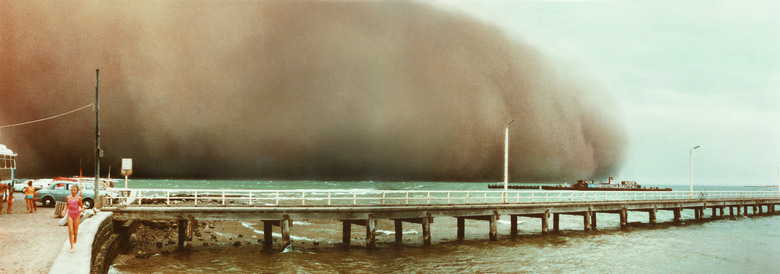Effects Of Soil Erosion On The Ecosystem
Over time, wind and water transport soil from one place to another, redistributing nutrients and organic material and reshaping the landscape. Extra-heavy rains, high winds, drought, rivers overflowing their banks and powerful ocean storms can permanently alter landscapes, sometimes for the better, and sometimes for the worse. Agriculture, development and other human activities can exacerbate this natural effect, vastly increasing the rate at which soil erodes. Increased erosion can have significant effects on the ecosystem of an entire region.
Nutrient Loss
Nutrient Loss
When soil erodes, the nutrient-rich and biologically diverse topsoil is the first to go. This makes it more difficult for plants to survive in the affected areas, reducing arable farmland and reducing the quality of crops that do grow in the degraded soil. The United States Department of Agriculture estimates that erosion costs farmers more than $27 billion a year due to reduced farm yields. Over time, natural breakdown of rock and accumulation of organic matter will regenerate the soil somewhat, but fields must lie fallow for an extended amount of time to counteract the erosion process.
Root Depth and Stability
Root Depth and Stability
Soil erosion also changes the depth of soil, reducing the amount of earth available for roots to take hold. Some species of plants lay down extensive root systems, both to absorb nutrients in harsh environments and to protect the plants against uprooting by storms, flood, or animal activity. An inability to lay down these deep root systems can leave plants malnourished and vulnerable to uprooting. Since established vegetation helps combat wind and water erosion, this weakening of plant life becomes a positive feedback loop. As plants lose their foothold, more soil washes away and causes more plants to fail in an ongoing process.
Water Pollution
Water Pollution
The material that washes away from farms and fields has to end up somewhere, and one of those places is in streams, rivers and bays. Soil washed into a river can alter the natural course of the waterway, changing its depth and even forcing the water into a new path over time. Worse, much of the topsoil that washes away from agricultural operations is rich in nitrogen-based fertilizers, which can combine with other nutrients in the water to support algae blooms. These sudden increases in algae populations can reduce oxygen content in rivers and the ocean, which kills any fish in the area.
Air Pollution
Air Pollution
Erosion can also affect air quality. In extremely arid conditions, topsoil becomes so dry that a strong wind can pick up the top layer and blow it away. This can cause dust storms, such as those that plagued the central United States during the droughts of the 1930s. According to the Earth Institute at Columbia University, more soil blew away due to wind erosion than the Mississippi carried to the sea in the same period. These powerful dust storms could kill exposed wildlife and aggravate respiratory problems. The clouds were so dense they could blot out the sun. Improved land management has reduced the frequency of dust storms, but the threat always lingers in areas of the country subject to powerful droughts.
References
- Columbia University: Did Dust Storms Make the Dust Bowl Drought Worse?
- United States Department of Agriculture: Effects of Soil Erosion on Soil Productivity and Soil Quality
- United States Department of Agriculture: Soil Quality Resource Concerns: Soil Erosion
- Integrated Crop Management: Soil Erosion: An Agricultural Production Challenge
- Mongabay: Soil Erosion and Its Effects
Cite This Article
MLA
Kazmeyer, Milton. "Effects Of Soil Erosion On The Ecosystem" sciencing.com, https://www.sciencing.com/effects-soil-erosion-ecosystem-21277/. 24 April 2017.
APA
Kazmeyer, Milton. (2017, April 24). Effects Of Soil Erosion On The Ecosystem. sciencing.com. Retrieved from https://www.sciencing.com/effects-soil-erosion-ecosystem-21277/
Chicago
Kazmeyer, Milton. Effects Of Soil Erosion On The Ecosystem last modified August 30, 2022. https://www.sciencing.com/effects-soil-erosion-ecosystem-21277/
